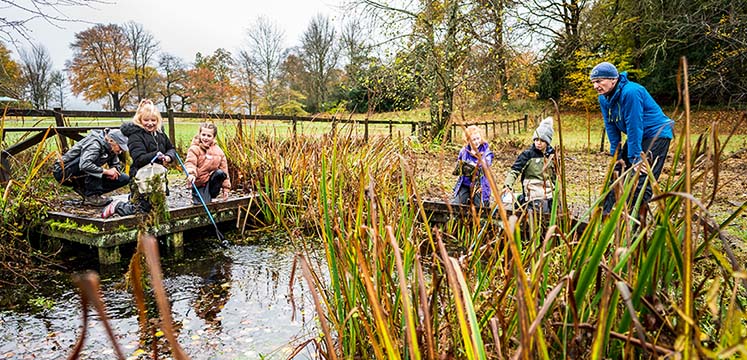
Thanks to funding from the Green Recovery Challenge Fund, our exciting project has restored and improved the wonderful natural habitats at our Visitor Centre, Brockhole on Windermere.
Visitors and young people have been inspired to protect and connect with nature through nature-focused fun activities, a programme of educational engagement for schools and placements to train young people in nature conservation.
This project focused on three key areas of work:
Brockhole's 30 acre grounds is home to lots of different habitats, including some UK BAP priority habitats. These habitats are some of those that were identified as being the most threatened and requiring conservation action under the UK Biodiversity Action Plan (UK BAP).
We hope that by giving back to nature, we will create a richer and more diverse landscape that can be shared and enjoyed for generations to come.
As part of The Green Recovery project we have put together resources we hope will be useful for teachers and group leaders delivering learning and engagement opportunities focused on nature and the natural environment.
Brockhole is free to visit with lots of activities on offer
Back in October, our Green Recovery Challenge Fund officers Oli and Vic, attended a weeklong placement in Czech Republic, learning all about orchards and fruit farming. This opportunity was provided by Grampus Heritage and Training Ltd, who offer a wide array of fully funded placements across a variety of sectors.
The week focused on sustainable rural development, organic gardening, and environmental protection, as well as the heritage and culture of Czech Republic. Both Oli & Vic stayed on a local farm approximately 2 hours from Prague and were shown traditional materials and techniques used on the farm, including scything, mulching and composting. They also learnt about a variety of fruit trees and visited multiple orchards throughout Prague, where they learnt how to plant and care for fruit trees.
This means our conservation officers are now equipped with the knowledge to take care of the two new orchards that they planted at Brockhole as part of the project. As well as using one of the orchards for educational purposes for their ‘Explore & Restore’ nature days.

This year, the Lake District National Park hosted the Staff Get Together training event at Brockhole on Windermere – the LDNPA visitor centre. This gave conservation officers Oli and Vic the opportunity to provide an ‘introduction to bushcraft’ session for the LDNPA staff, after completing their own bushcraft training earlier in the year.
Bushcraft is all about the practice of self-reliance within the wilderness and although it is not necessarily about survival, the skills you learn through bushcraft can aid you in wilderness survival situations. Ultimately bushcraft is about learning and gaining confidence in the natural environment, and it offers a great gateway to understanding and immersing ourselves in the landscape.
For this reason, Oli & Vic wanted to offer a session that was in line with the goals of the Green Recovery Challenge Fund project – in connecting people to nature and simply having fun in the great outdoors! Throughout their time delivering the project, they have focused on primarily teaching young children, so it was a unique opportunity to train adults from various departments within the organisation.
The session itself involved looking at the three components of bushcraft: shelter, fire, and water. Oli looked at water filtration and how you can use materials found in the natural environment to filter any surrounding water sources to a level that can then be purified. He also briefly discussed fire building, natural tinder's and how to light fires safely in the environment. Meanwhile, Vic covered shelter building by explaining how you could build an A-frame type shelter from natural materials around you. She also demonstrated two types of knots that could be used to successfully put up a hammock for a safe and comfortable night's sleep in the wild.

20 July 2022
One of the aims of the Green Recovery Project is to facilitate outdoor education and allow students to engage with nature. We do this through two overarching themes, the first being exploration. This could be anything from walking through the woods and using our senses to enjoy the biodiversity around us, to dipping a net into our ponds to see what we can catch. The second theme revolves restoration, this means the students doing something that has a positive impact on the environment.
The first round of our spring to summer Explore & Restore Nature Days at Brockhole has been very successful. We have reached 749 pupils across 23 different schools from around the North West of England, and we have received some very encouraging feedback from the students who felt more connected to nature after their session.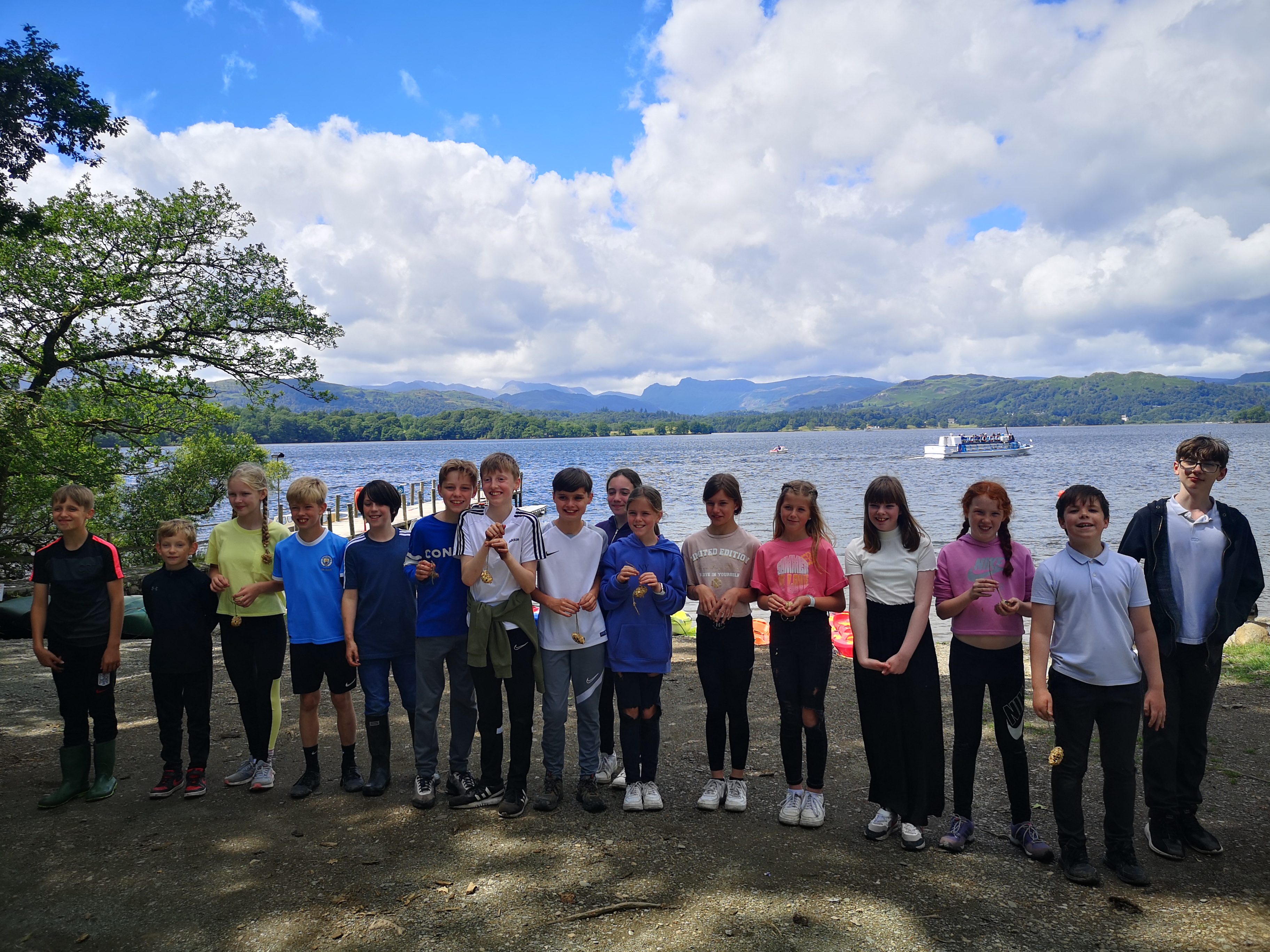
St. Catherine's CoE Primary School Year 5/6 in front of Lake Windermere, taking part in the Explore & Restore nature days.
22 June 2022
Being outside in the elements brings us all benefits, benefits that are much more extensive than can be typed up here into a meagre list. Even if those benefits are that of a greater appreciation and gratitude for the comforts that we are so lucky to have in our homes. Being outside is just good for the soul.
Part of the project was to create spaces where students could learn in accessible and enjoyable places. A place that offered an experience not just a classroom.
To really help students engage with the amazing habitats and wildlife, without compromising the condition and status of the areas, we teamed up with Lowther Forestry who did an amazing job building our two new outdoor classrooms and boardwalks into the fen and wet meadow habitats.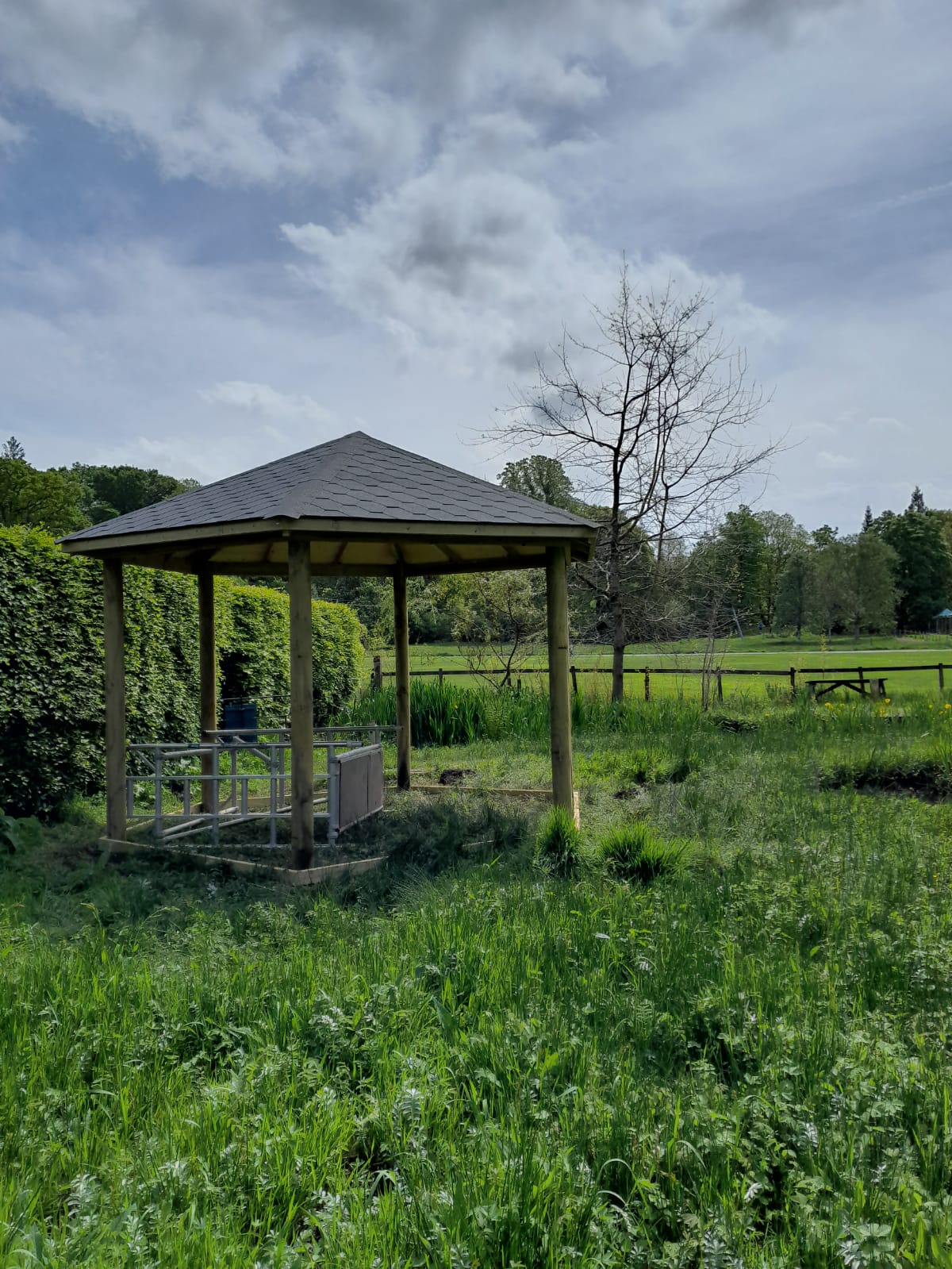
New outdoor classroom in pond area to be used for educational sessions.
30 May 2022
This year, Brockhole has 3 new honey bee hives and a set of bees that have moved into an human-engineered bee log. This contributes to our effort of increasing pollinators on site to assist in the pollination of the many beautiful plant species and trees we have here.
The hives can be seen from our new Bee shelter (image). The hives themselves are William Broughton Carr (WBC) hives, and are the iconic, often white hives used since the 1800’s. The third hive is behind a door and is an observation hive to see the bees in operation. We use the observation hives with school groups and will be showing some of the public in our summer activities.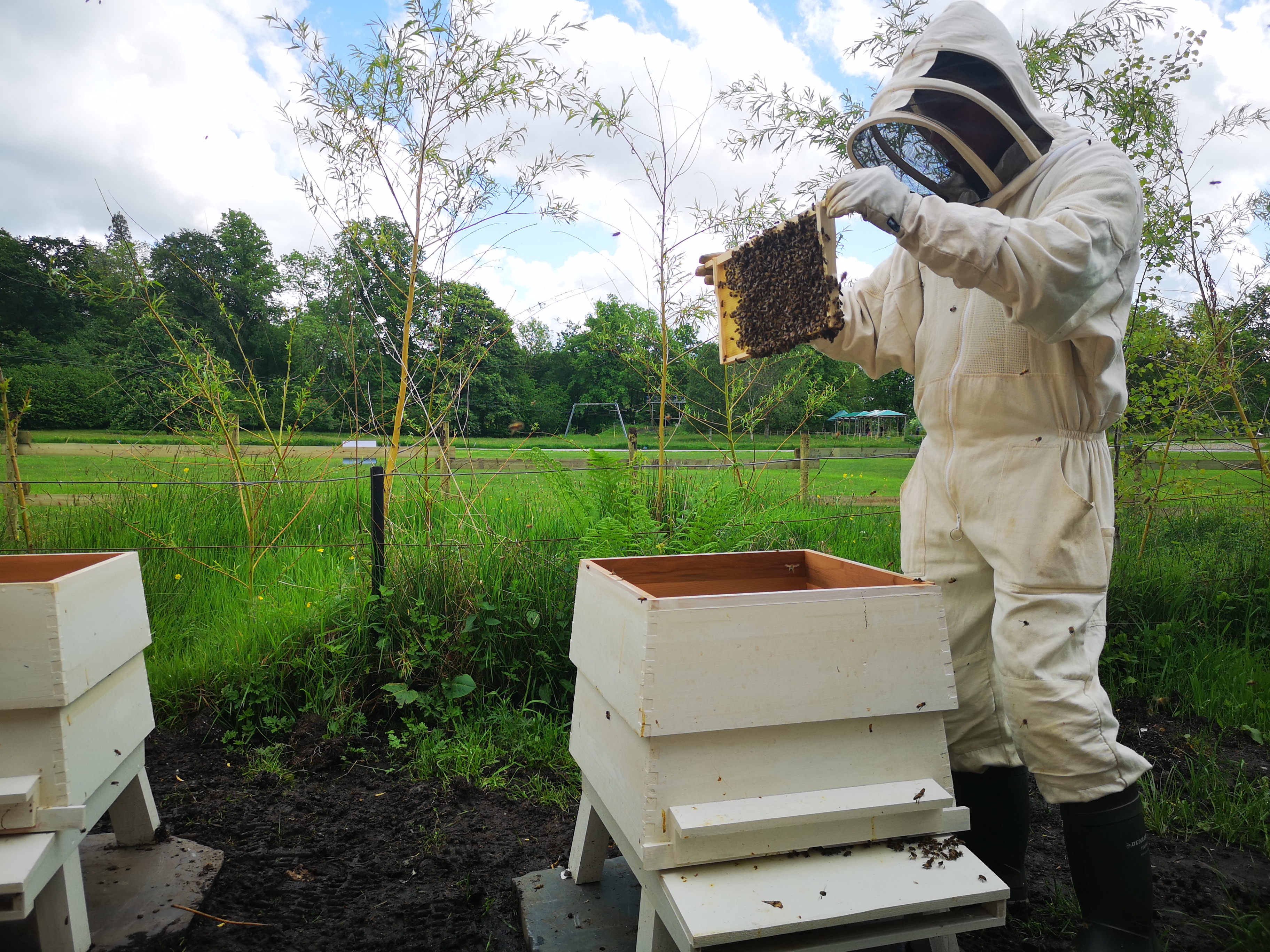
Beekeeper Ben checking the bees at Brockhole.
24 May 2022
We have expanded the ‘tall herb fen’ priority habitat – which is now over doubled in size. This is the area around the ponds. The extended fen is now blooming and filled with various flowers including ragged robins and flag iris, which is providing the perfect habitat for butterflies, and hundreds of tiny froglets!
The old pond is currently hosting a lot of newts, which is fantastic news as they have not been seen in such abundance. We will be looking to create some newt shelters for our amphibious friends.
Keep an eye out in mid-august as we will be increasing the amount of information boards around site with lots of fun facts about our ponds and the rest of the habitats at Brockhole.
Two frogs in the pond at Brockhole.
7 April 2022
You may have noticed that there is a new fence line around our lakeshore. One of the issues Lake Windermere is prone to is erosion. Increased footfall on the lakes edge means the plant communities that would normally grow and absorb some of the impacts of fluctuating water levels are trampled and therefore don’t offer the same protection. Leading to increased erosion of the soils.
There are still a marked places to access the lake at Brockhole as it is important the we all get to enjoy Windermere. After all, it’s a pretty special place. We just need to be able to enjoy it in a way that is sympathetic to the environment, and leaving the lake edge to the plants to grow so that the and soils to repair won’s just save the land from disappearing but also benefits our frogs, toads, dragonflies, birds and otters that call this their home too.
Volunteers erecting new fence along the lakeshore edge at Brockhole.
31 March 2022
Conservation officers Oli and Victoria have been making minibeast windows to put around Brockhole.
Over time the wood will decay, attracting lots of different bugs including beetles, woodlice, slugs, and worms.
Why not make your own minibeast window to put in your garden and be sure to lift them up carefully when checking what's underneath!
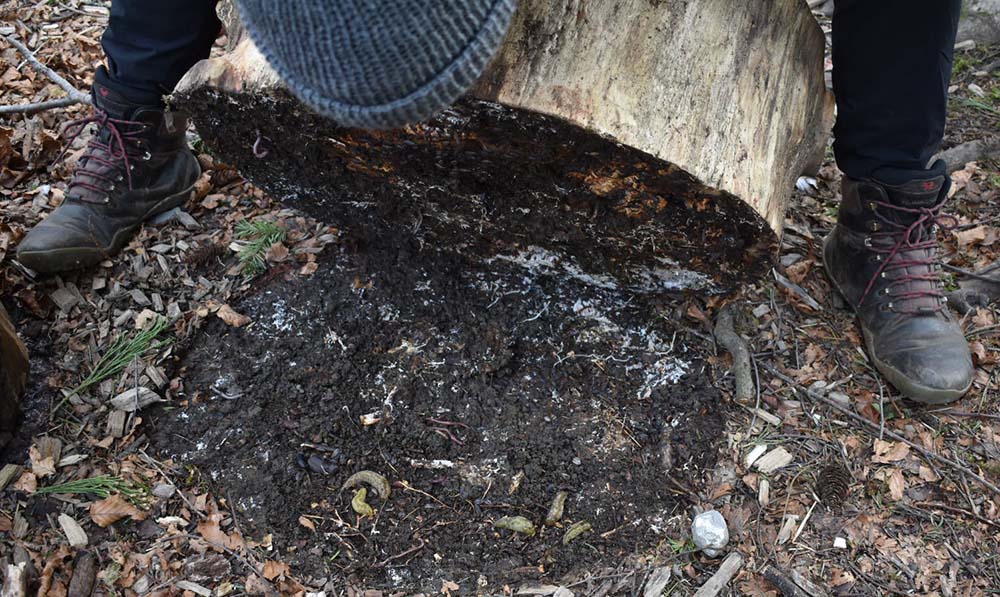
31 March 2022
Our new pond creation is well underway here at Brockhole on Windermere. The plan is to create two new ponds and allow the surrounding Tall Herb Fen habitat to expand.
The primary goal is to increase biodiversity of both flora and fauna species and to use the area for educational purposes; highlighting the importance of ponds and drawing attention to their decline.
Digger creating two new ponds at Brockhole.
7 January 2022
If you happen to be walking in Birkett wood at Brockhole, you may find yourself wondering down a set of rustic, natural stairs. These stairs were created by the Earnest Cook Trust trainees that come to Brockhole as part of their Land Management course. To promote the idea of sustainability, a lot of the materials used were taken from the fallen trees that came down in the 2021 Storm Arwen.
Humans, much like the wildlife around us, often look for the easiest ways to get to places. This means, we tend to follow well-trodden paths, creating something called ‘desire lines’ - it makes sense, it’s the easiest way! But, when you get extraordinary numbers of people, say close to 300,000, as Brockhole does, desire lines can lead to excessive erosion. Which was the case on this path. This is why we created the steps to make it easier for people to get up into Birkett wood whilst reducing the impact of erosion.
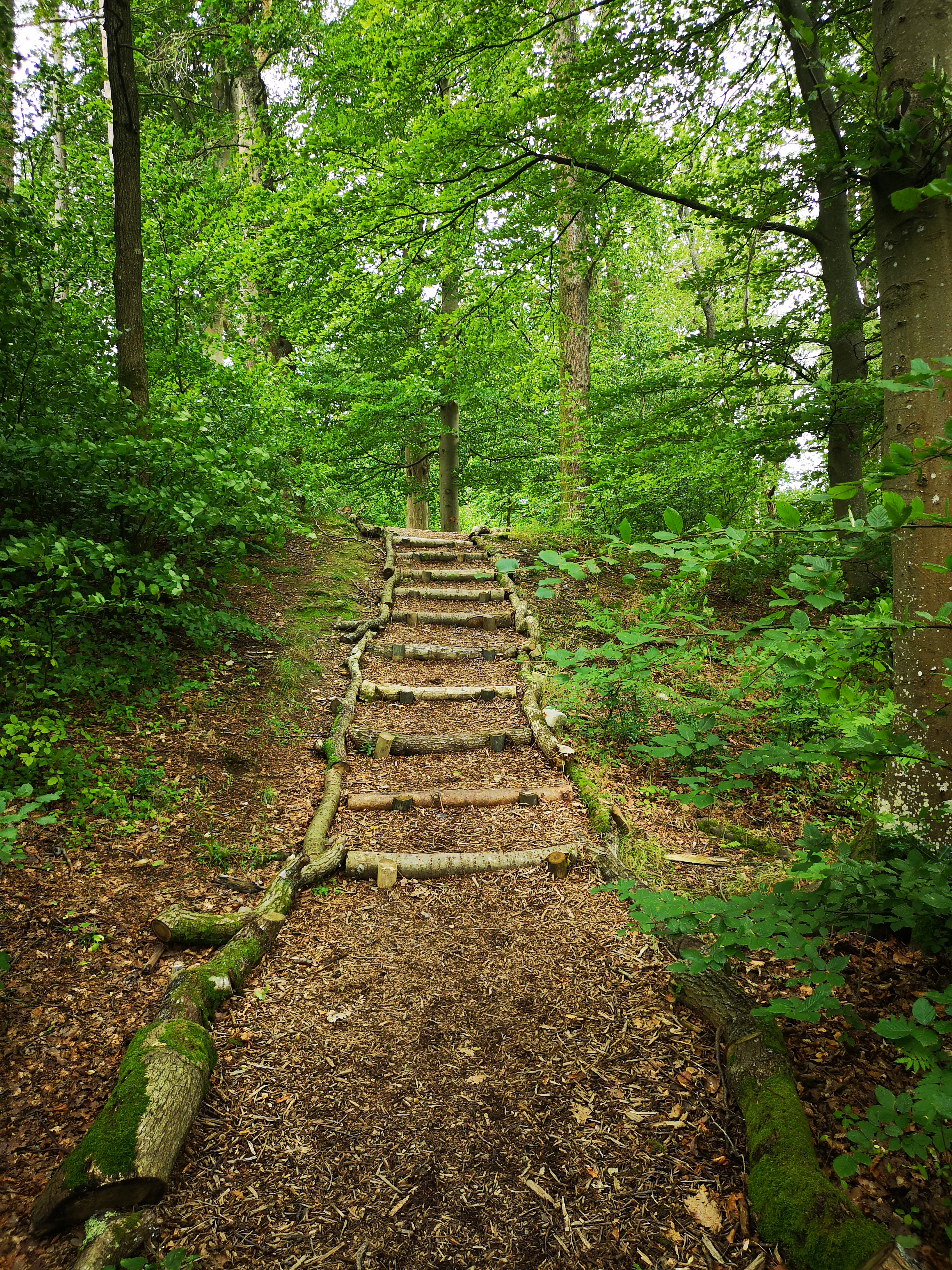
Natural steps made from fallen debris leading up into Birkett Wood.
30 November 2021
Orchards provide an excellent opportunity for people to connect with their natural surroundings. Here, in these havens, we can see trees producing delightful fruits; insects buzzing round pollinating trees and wild flowers; wildlife feeding on fallen fruits; rotting fruit decomposing to enrich the soils beneath. Yet, despite this wonder, the traditional orchard is in decline, which is why we’re doing our bit to increase this habitat once more.
At Brockhole, we have planted 35 fruit trees in two areas. One is accessible to all and is located near the Barbeque/Garden Shed area, where you can walk on a path marvelling at the young trees as they grow. We are asking people not to pick the fruit as we are leaving these for these for wildlife. The second area has been planted for educational purposes and will be used by school groups to understand the importance of traditional orchards.
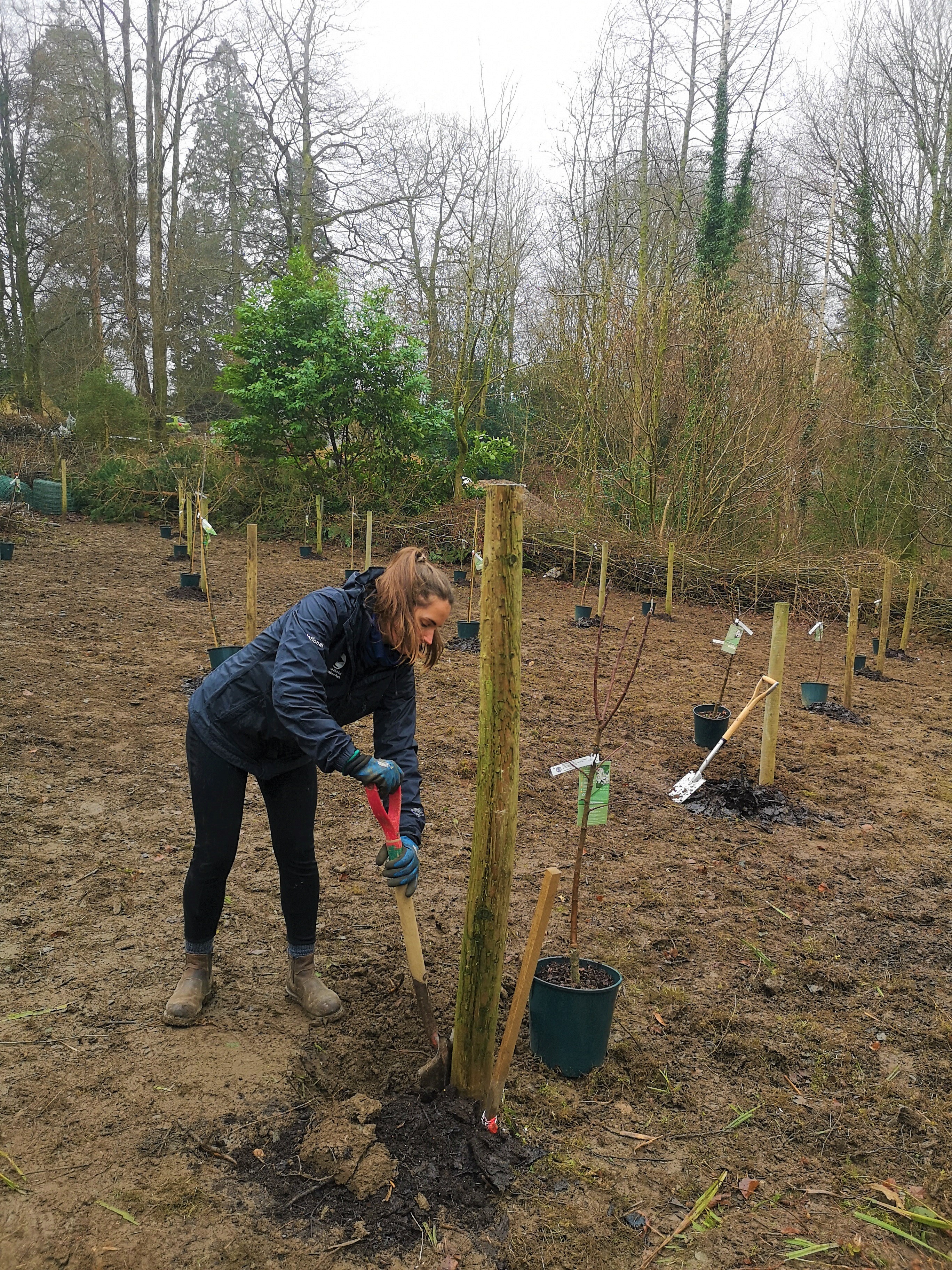

The project is funded by the government’s Green Recovery Challenge Fund. The fund was developed by Defra and its Arm's-Length Bodies. It is being delivered by The National Lottery Heritage Fund in partnership with Natural England, the Environment Agency and Forestry Commission.
The Lake District National Park Authority will work alongside The Ernest Cook Trust to deliver this project centred on nature recovery.